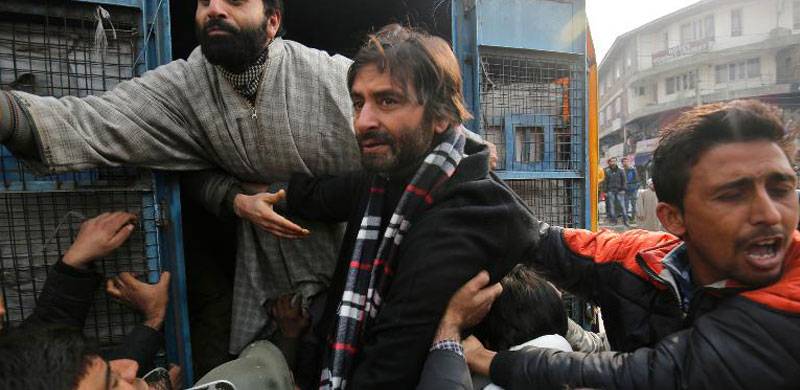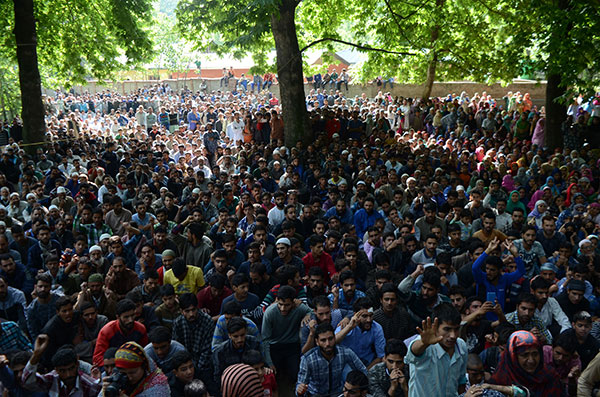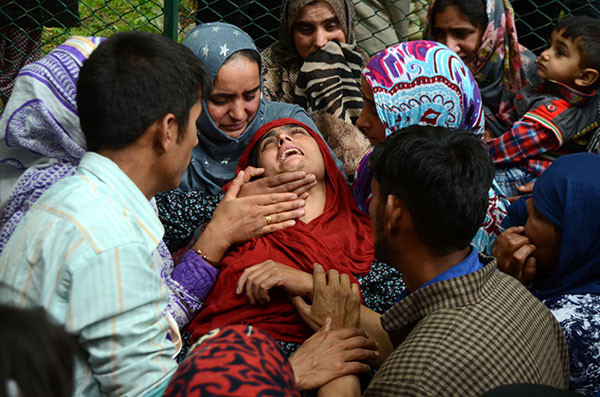
The Pulwama suicide bombing seems to have changed Kashmir irrevocably, at least for now with an ascending Hindu nationalist BJP in India launching a sweeping crackdown against the Hurriyat in the aftermath of the attack that killed at least 49 Indian paramilitary troopers.
After banning the socio-religious outfit Jamaat-e-Islami Jammu Kashmir last month, New Delhi on Friday declared Jammu Kashmir Liberation Front headed by Yasin Malik which had renounced violence in 1995 to adopt peaceful means for resolution of Kashmir issue as an ‘unlawful’ group.


According to reports, more Hurriyat parties are going to face ban under ‘anti-terror’ laws in coming days. The dark days are far from over.
The action against the Hurriyat comes amid intense and massive counterinsurgency operations by New Delhi against militants and their sympathisers in Kashmir. In the last few months, over 500 prominent separatists, Jamaat leaders and activists, and the so-called overground workers of the militants have been arrested and many of them have been slapped with the Public Safety Act, a ‘draconian’ legislation described by Amnesty International as a “lawless law”.
https://www.youtube.com/watch?v=Fc4tOZsMNmY
With the democratic space for dissent shrinking and military crackdown taking precedence over dialogue, Kashmiris are feeling boxed into the corner. Earlier this week, a young Kashmiri teacher, Rizwan Pandit, a Jamaat activist, died in police custody. His family alleged that he was murdered. The torture marks - bruises, cuts, burn marks on his body - told the story of his last hours.
Two days after his death, his friend from school days joined militants. This story of one young man venturing on the ‘path of no-return’ after witnessing the blood of their friend, relative or neighbour has repeated itself with such deadly regularity that even the security agencies in Kashmir are unable to differentiate between a militant and a civilian.
Last year was the bloodiest in a decade in terms of militant killings. This year may get even worse.
https://www.youtube.com/watch?v=6VkU8c62YFU&t=1s
However, there is a glimmer of hope. With the general elections set to begin in India from next month, poll analysts believe the BJP is unlikely to sweep the elections the way it did in 2014. People in Kashmir feel the night of darkness will end on May 23 when the results of elections will be declared. And even if BJP comes to power again, there is a faint hope that India and Pakistan will talk Kashmir.
After banning the socio-religious outfit Jamaat-e-Islami Jammu Kashmir last month, New Delhi on Friday declared Jammu Kashmir Liberation Front headed by Yasin Malik which had renounced violence in 1995 to adopt peaceful means for resolution of Kashmir issue as an ‘unlawful’ group.

Thousands attend funeral procession of a civilian Aijaz Ah Bhat who was killed by Army at Nowpora Kulgam last Monday | Photo Credit: Muneeb-ul-Islam

Women at Aijaz Ah Bhat's funeral | Photo Credit: Muneeb-ul-Islam
According to reports, more Hurriyat parties are going to face ban under ‘anti-terror’ laws in coming days. The dark days are far from over.
The action against the Hurriyat comes amid intense and massive counterinsurgency operations by New Delhi against militants and their sympathisers in Kashmir. In the last few months, over 500 prominent separatists, Jamaat leaders and activists, and the so-called overground workers of the militants have been arrested and many of them have been slapped with the Public Safety Act, a ‘draconian’ legislation described by Amnesty International as a “lawless law”.
https://www.youtube.com/watch?v=Fc4tOZsMNmY
With the democratic space for dissent shrinking and military crackdown taking precedence over dialogue, Kashmiris are feeling boxed into the corner. Earlier this week, a young Kashmiri teacher, Rizwan Pandit, a Jamaat activist, died in police custody. His family alleged that he was murdered. The torture marks - bruises, cuts, burn marks on his body - told the story of his last hours.
Two days after his death, his friend from school days joined militants. This story of one young man venturing on the ‘path of no-return’ after witnessing the blood of their friend, relative or neighbour has repeated itself with such deadly regularity that even the security agencies in Kashmir are unable to differentiate between a militant and a civilian.
Last year was the bloodiest in a decade in terms of militant killings. This year may get even worse.
https://www.youtube.com/watch?v=6VkU8c62YFU&t=1s
However, there is a glimmer of hope. With the general elections set to begin in India from next month, poll analysts believe the BJP is unlikely to sweep the elections the way it did in 2014. People in Kashmir feel the night of darkness will end on May 23 when the results of elections will be declared. And even if BJP comes to power again, there is a faint hope that India and Pakistan will talk Kashmir.
